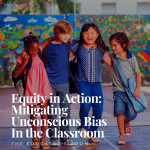Have you signed up for The Educator’s Room Daily Newsletter? Click here and support independent journalism!
As a primary teacher, I had interesting and sometimes challenging conversations on a regular basis. Young children do not limit their comments and questions to what’s “age-appropriate” or what is or isn’t “divisive.” They are trying to figure out their world, seeking answers, and exploring their curiosity. Their comments and questions deserve our calm and respectful responses.
Tony, a child in my second grade class years ago, rarely completed homework. So as I visited with Tony at a math station one day, I reminded him of the upcoming math assignment. “Tony,” I said, “it’s really fun homework tonight. You get to write two story problems for the class to solve tomorrow. Daddy can help you!”
“No,” said Tony. “My daddy can’t help me. He gets high at night.” He mimed smoking a joint. “You know what ‘high” is, Ms. L.?”
I hoped no other children were listening. I did not look forward to a chorus of, “What’s ‘high,’ teacher?” Instead, I said simply, “Yes, Tony. I know what that is. Daddy can still help you.” Satisfied with my response, Tony shrugged, “Okay!” and rejoined his classmates in their math game.
Recent political debate on what is “age-appropriate” and “divisive” in classrooms got me thinking about life as a primary grade teacher and, in particular, about Tony. I will admit to breathing a sigh of relief as Tony accepted my matter-of-fact response, as I did not relish the idea of a class discussion on pot.
Still, I strived to never ignore, embarrass, or scold children in these situations, although I often used redirection. For example, when Ashley announced to the class in the middle of an art project, “My mom got a new job dancing in a club,” I said, “Hey, Ashley, tell me about that during recess. Right now, tell me about the colors you chose for your artwork.” Ashley was fine with that redirection and privately told me later, in great detail, about her mom’s new job.
Other times, I would simply ask, “What made you think of that question?” This helped me assess whether a child sought a quick answer or a deeper dialogue on a seemingly off-topic statement. Once, in the middle of a literature discussion about a cat story, Nevaeh asked, “What’s reproduction?” I could have tried, with dread, to give an age-appropriate definition of human reproduction. Instead, I simply asked, “What made you think of that question, Nevaeh?” She said, “This cat in the book looks like the one on the wall. Is that called a reproduction?” Crisis averted, by simply probing deeper before responding. I still got to explain the other “reproduction” later in the year when the darkling beetles in the science bin started laying eggs.
Primary teachers understand that topics that some deem “touchy” or “controversial” may arise during the course of a day with young children. Smoking pot, stripping, and sex were certainly not in my second-grade curriculum, but I could respond to children’s comments on these topics in respectful and age-appropriate ways.
Over the years, other children wondered if certain colors were “just for boys” and whether boys could wear earrings; if girls could play football or be president; why some people ask for money on street corners; and whether you had to vote for the same person your mom voted for. I never once told a child that I could not respond because their topic was “not age-appropriate” or was “politically divisive.” I never feared when I responded that someone would accuse me of indoctrination, claim I had a hidden agenda, or sue me for instruction not specifically detailed in my curriculum.
Whenever I had one of these non-scripted moments with a child, I’d call that child’s parents and gently share the content as a learning anecdote. We’d sometimes have a little laugh, occasionally dig deeper, and often move on to other child-related issues. When I called Tony’s dad to tell him about his son’s “high” comments, we didn’t really discuss pot. We talked about homework. And in case you’re wondering, Tony’s dad helped him complete homework the rest of the year.

Julie Letofsky taught young children in Arizona public schools for 33 years. She enjoys writing about the amazing things that occurred as she worked with children to become readers, writers, problem solvers, and decent people. She is a three-time National Board Certified Teacher, Early Childhood/Generalist.
Editor’s Note: If you enjoyed this article, please become a Patreon supporter by clicking here.







Children often have few filters and you know more than you wish you knew!